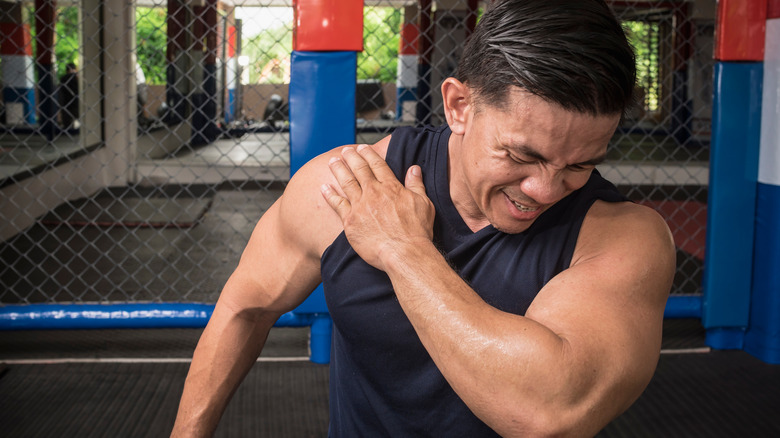Can Physical Therapy Fix A Torn Rotator Cuff?
Made up of four muscles, your rotator cuff tendons are what hold your arm securely into your shoulder blade, reports OrthoInfo. Facilitating your arm's range of motion, we can thank our rotator cuff for our ability to lift and swing our arms up and around freely. However, nearly 2 million Americans experience a rotator cuff tear annually.
Characterized by symptoms of pain, weakness, and crackling sensations, a rotator cuff tear can make day-to-day activities challenging. In the event of a partial tear, the tendon will have thinned, but it will not have been severed from the bone. Those with a full-thickness tear, however, will have suffered full or partial disconnect of the tendon from the bone. A torn rotator cuff can be the result of age-related breakdown or stem from an injury, such as a broken collar bone, shoulder dislocation, or a fall onto your arm. Therefore, older adults, people who play sports, and those with jobs involving repetitive overhead motions, such as painters, are considered to be at an increased risk for rotator cuff injury.
While there are various surgical options for treating a torn rotator cuff, physical therapy is also commonly used as a treatment method, explains Mayo Clinic.
Physical therapy or surgical treatment options?
Experts at Advanced Kinetics emphasize that physical therapy alone will not outright fix a torn rotator cuff. Rather, it's an effective means of rebuilding shoulder muscle strength and restoring function to help make up for what was lost due to injury. WebMD adds that physical therapy can also help alleviate discomfort and protect against doing further damage to a mild tear.
Dr. Eric McCarty, orthopedic sports medicine specialist and chief of Sports Medicine and Shoulder Surgery with the Department of Orthopedics at the University of Colorado School of Medicine, tells UCHealth that for some patients, physical therapy is enough to effectively manage their injury. As a co-author on a 2013 study, Dr. McCarty's research showed that three-quarters of patients with full-thickness rotator cuff tears who underwent physical therapy treatment reported significant improvement throughout a two-year follow-up period and did not require surgery. "We know there are people who can live with rotator cuff tears," Dr. McCarty states via UCHealth. "We want to try to identify the characteristics of those who get well with physical therapy. I'm an orthopedic surgeon, but that doesn't mean I'm looking to do surgery every time."


